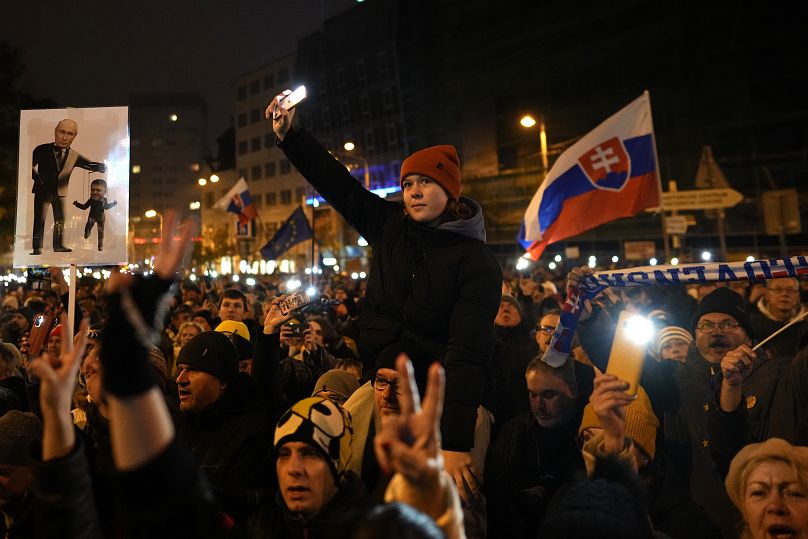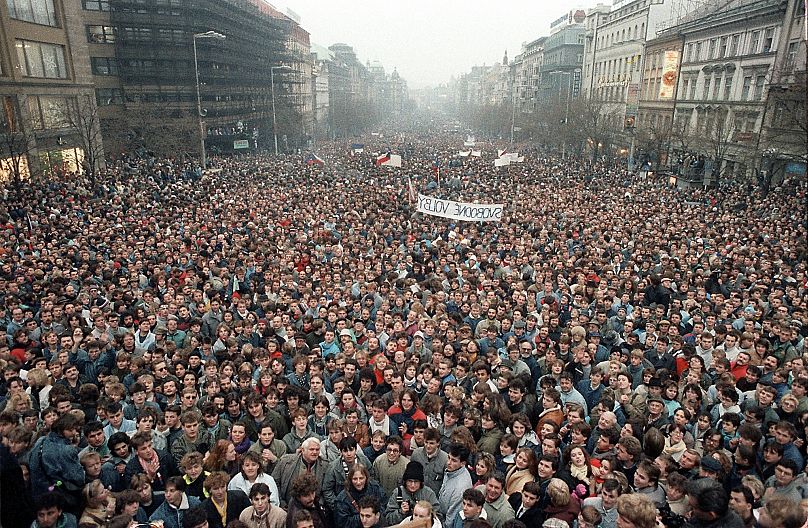The protest united the opposition, including the liberal Progressive Slovakia, pro-business Freedom and Solidarity and the conservative Christian Democrats who all say Fico is a threat to democracy.
Thousands of protesters have gathered in Slovakia's capital on the 35th anniversary of the start of the Velvet Revolution that brought an end to decades of communist rule in the former Czechoslovakia to oppose the policies of populist Prime Minister Robert Fico.
The protest united the opposition, including the liberal Progressive Slovakia, pro-business Freedom and Solidarity and the conservative Christian Democrats who all say Fico is a threat to democracy.
'The government takes our freedom and democracy,' a banner in the crowd read.
"Slovakia is and will be part of the Western civilization," a conservative political veteran František Mikloško, who was one of the Slovak leaders in 1989, told the crowd in downtown Bratislava.
"We don't want anyone to move us toward Moscow."
Freedom and Solidarity leader Branislav Gröhling said Fico is leading the country "to an authoritarian regime like in Russia and communist China."
Michal Šimečka, the head of Progressive Slovakia, which is currently the most popular party in the country, said the opposition will do what it takes to protect freedom and democracy.
"Slovakia is and will be a nation of free people. And free people won't be silent," he said.
Fico and his leftist Smer (Direction) party won last year's parliamentary elections on a pro-Russia and anti-America platform.
His government has pushed through a plan to overhaul public broadcasting, a move critics said would give the government full control of public television and radio.
That, along with a move to amend a penal code and eliminate a special anti-graft prosecutor, has led opponents to worry that he would lead Slovakia down a more autocratic path, following the direction of Hungary under populist Prime Minister Viktor Orbán.
Fico's views on the war in Ukraine and other issues differ sharply from the European mainstream.
Fico ended his country's military aid for Ukraine, opposes EU sanctions on Russia, wants to block Ukraine from joining NATO and plans a trip to Russia.
The fall of Communism
The Velvet Revolution, so called because of its non-violent nature, took place from 17 November to 28 November 1989 and was one of several anti-Communism movements in eastern Europe at the end of the eighties.
Demonstrations and strikes against the one-party government of the Communist Party of Czeschoslovakia included people from across the civilian spectrum, from students and older dissidents.
The result was the end of 41 years of one-party rule in the country, the dismantling of the centrally-planned economy and the transition to a parliamentary democracy.
Czechoslovakia peacefully split into the Czech Republic and Slovakia in 1993.













